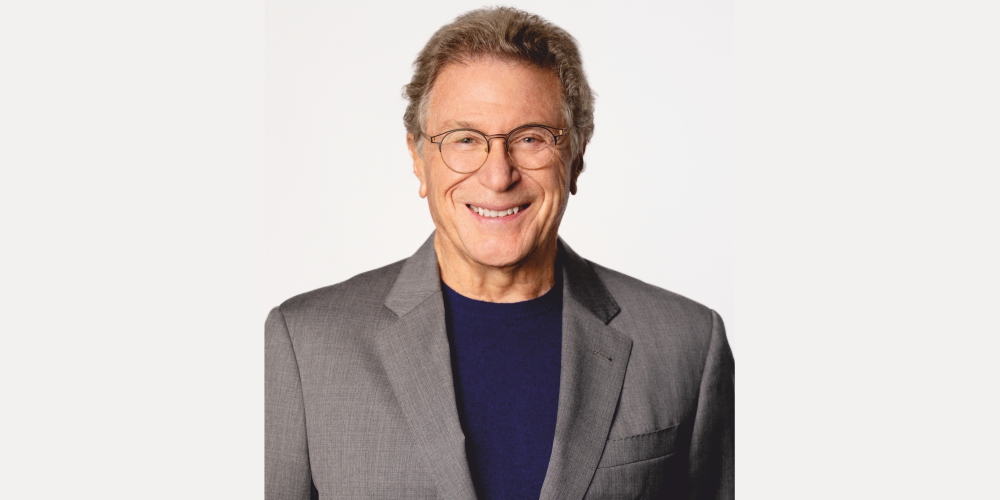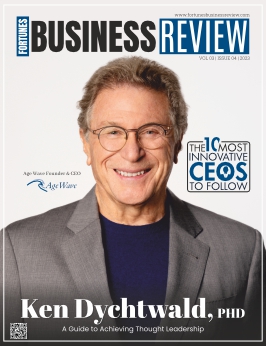Ken Dychtwald, PHD: A Guide to Achieving Thought Leadership
The 10 Most Innovative CEOs to Follow

Becoming a thought leader involves a combination of expertise, creativity, drive and effective communication. The goal of “thought leadership” is to establish a reputation for being at the forefront of new ideas and developments, and to establish oneself as a trusted source of information and insights in a particular area of expertise.
Ken Dychtwald, PhD, has emerged as North America’s foremost visionary and original thinker regarding the social, economic, healthcare, marketing, financial, and workforce implications of the “age wave,” a term he coined in the 1980s. In addition to being the Founder and CEO of Age Wave LLC, he is a psychologist, gerontologist, documentary filmmaker, and best-selling author of 19 books, including his three latest, What Retirees Want: A Holistic View of Lifes Third Age, Radical Curiosity: One Mans Search for Cosmic Magic and a Purposeful Life, and Sages of Aging: A Guide for Changemakers. His client list has included more than half the Fortune 500, and his research has garnered more than 20 billion media impressions worldwide.
Ken, like many others, has always been intrigued by modern thought leaders and their impact on the world. He wonders what makes these individuals so captivating and thought-provoking, from John F. Kennedy and his moonshot pursuits to Martin Luther King and his inspiring speeches, Bob Dylan’s cultural influence, Betty Friedan’s activism for women’s rights, Steve Jobs’ reinventions, and Elon Musk’s brilliant but controversial behavior. Although he hasn’t gone to a thought leadership school, Ken has been trying to be a visionary leader in the fields of gerontology, longevity, and business for many years. Through his experiences, he has come to believe that there are seven crucial elements to becoming a visionary leader.
First: Ken believes that a key aspect of being a thought leader is having a clear and compelling vision and mission and being able to effectively and passionately communicate it to others. The vision should be forward-looking, outlining the desired future state, the path to get there, and the roles others will play in realizing it. Thought leaders can impact the master narrative and potentially the world in three ways: i) by creating or shaping a specific field, like Edison with light bulbs or Dr. Spock with parenting; ii) by widely influencing the general public, as Oprah has done through her TV shows and book clubs; or iii) by influencing the influencers, as Tom Peters did by inspiring thousands of leaders in business, non-profit, and government to strive for excellence. Ken has chosen the third path, as it aligns with his strengths, weaknesses, and the life he hopes to live.
Second: Cultivating excellent communication skills is essential for being a thought leader. In today’s highly media-engaged society, simply publishing a study, an article, or a memo is not enough. To be an effective thought leader, one must be able to communicate persuasively using multiple media. While some may believe that effective communication is a natural talent, Ken disagrees. He believes that with hard work and practice, anyone can improve their communication skills, and they can even use classes, workshops, and coaching to rapidly progress.
When Ken set out to promote his vision of a new image of aging, he realized that many of his academic heroes, despite being smart and innovative, lacked persuasive communication skills. He realized that to have a real impact, he needed to improve his ability to sell his ideas. Although there were no courses on how to be a persuasive salesperson in the field of gerontology, he enrolled in several sales training programs to develop and enhance his communication skills. Over the years, he has given presentations to over two million people worldwide, and throughout his professional life, he has worked with speaking coaches to continuously improve his effectiveness as a thought leader, with nearly weekly coaching sessions.
Third: Ken believes that having accurate, up-to-date information is crucial to being a successful thought leader. When speaking to a wide audience, it is imperative to know your subject matter inside and out and to be able to back up your claims with solid evidence. Confusing your issues or presenting incorrect information can quickly undermine your credibility and reputation. Ken has sought out experts in fields of interest and made an effort to understand what his audience, employees, and influentials are thinking about to ensure that his knowledge is current and comprehensive. For example, when he wanted to better understand the history of aging, he reached out to Dr. Andrew Achenbaum, the leading expert on the subject, and asked him to tutor him. Similarly, when he became more involved with the economic implications of the aging population, Ken sought out financial experts to educate him on finance. Through these efforts, Ken has been able to continuously improve his understanding of important issues and become a better-informed thought leader.
Fourth: It’s important to be open to feedback and to continuously improve your vision. This requires a willingness to learn and a willingness to make changes in your approach. In Ken’s case, he sought advice from experts in different fields including psychology, holistic health, gerontology, finance, and even civil rights. He was able to incorporate new perspectives and insights into his work and even rewrote his eighth book, Age Wave, based on a conversation he had with Father Charles Fahey. By being open to feedback and willing to make changes, Ken was able to make a greater impact in his field and communicate his ideas more effectively. This is a reminder that no matter how knowledgeable or experienced you are, there is always room for growth and improvement in the art of communication.
Fifth: According to Ken, having mentors is essential for anyone who wants to become a leader, whether a thought leader or any other type of leader. It’s crucial to find mentors who are not just cheerleaders, but people who can guide and challenge you to reach your full potential. Ken’s mentors came from diverse backgrounds such as gerontology, communications, business, and politics. He even had the opportunity to have President Carter as a mentor, which is a rare experience. Mentors can come from various sources, such as coworkers, students, clients, or even grandchildren. Chip Conley, the author of Wisdom@ Work: The Making of a Modern Elder, has introduced the concept of a “mentern,” which combines the qualities of a mentor and an intern. Both Ken and Chip believe that great leaders are those who are both wise and constantly seeking knowledge.
Sixth: Along with the skills and resources, to be a successful leader, you also require courage and an unbreakable spirit. Leading can be a challenging and demanding journey, with both high and low moments. You may receive praise and recognition, but you’ll also face disagreements, rejection, and disappointment. As a leader, you’ll experience failures, and your dreams may not always come to fruition. Some days, you’ll feel confident in your ideas, only to find that others don’t pay them any attention. Leading on complex or groundbreaking issues, especially those that involve fighting for others’ rights, can be especially difficult. However, there will be moments when your ideas take root and have a far-reaching impact, providing a sense of exhilaration.
Seventh: Ken highly emphasizes the importance of having a supportive network, as the journey of being a leader can be a rollercoaster of emotions and experiences, both positive and negative. He believes in having a strong support system, whether it’s faith, community, a work team, or family, to help you weather the ups and downs. In Ken’s case, his wife, children, brother, work partners, and earlier, his parents, have been his strongest sources of support. At the same time, he warns against getting too caught up in your own success, as fame can lead to delusions of grandeur and foolish behavior. To avoid this, it’s crucial to have people in your life who will keep you grounded and be honest with you, providing the love and support you need to achieve your goals and make a positive impact on the world.
According to Ken, the most remarkable leader he has ever met was Nelson Mandela. Ken had the opportunity to see him speak at the World Economic Forum in Davos, Switzerland, in 1999, where he arrived three hours early to secure a front-row seat. Despite the theme of the speech being democracy, what Ken recalls most about that day was Mandela’s exceptional humanity. He stepped onto the stage with a welcoming smile and was tall, lean, and handsome, even though he was 81 years old and appeared frail. Despite his seemingly delicate appearance, he exuded a strength and an intensity that was almost supernatural. He spoke with kindness and gentleness, but his presence was so powerful that everyone in the room was captivated by him. He didn’t boast or posture, but his humility and wisdom were such that everyone in the audience wanted to learn from him. Ever since that day, Ken has revered Mandela as an exceptional thought leader.
Website: www.agewave.com




